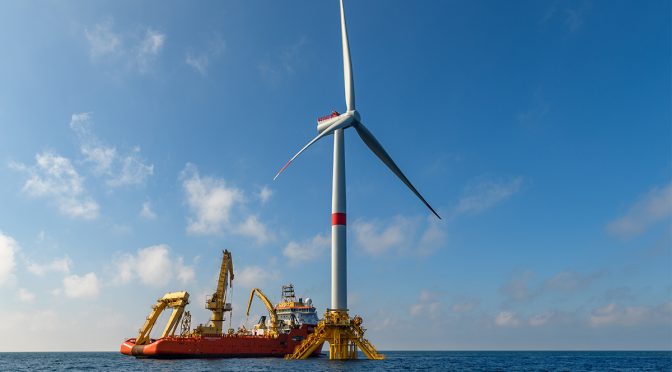Yesterday France announced the winners of the 250 MW South Brittany floating offshore wind auction, the world’s first commercial-scale floating offshore wind auction. This is a major milestone for floating offshore wind technology. So far Europe has only built small pilot and demonstrator projects. With yesterday’s announcement floating wind took a big step towards commercialisation and large-scale deployment.
Yesterday French Minister Delegate for Energy Roland Lescure announced the auction results for the 250 MW floating wind site off the coast of Southern Brittany. It was the first time a country has held a commercial-scale auction to award a feed-in tariff for a floating offshore wind farm.
The announcement took place as Minister Delegate Lescure inaugurated France’s second fully-commissioned bottom-fixed offshore wind farm in Fécamp (Seine-Maritime).
WindEurope Chief Policy Officer Pierre Tardieu said: “Floating wind is here to stay. The demo projects have worked. Now is the time to scale-up to large projects. The French auction was a milestone in the history of floating wind technology. It puts France up there with the leading countries in floating offshore wind.”
The significance of the French auction
Floating offshore wind is key to unlocking offshore sites with water depths of 60 meters and more. In these areas floating offshore wind turbines are more cost-competitive than traditional bottom-fixed turbines. As such, floating offshore wind holds the key to offshore wind development in large parts of the Atlantic, the Celtic Sea, the Mediterranean Sea, the Norwegian Sea and other sea basins with higher water depths.
The French auction is a major milestone. The tendered 250 MW site will not only be the biggest floating offshore wind farm in Europe upon completion. It will also more than double Europe’s current floating offshore wind capacity.
The auction was won by a consortium of BayWa re and Elicio. 10 different consortia bid, showing the huge interest in developing floating offshore wind. The winning bid was awarded at €86/MWh.
So far Europe has only installed small demonstrator and pilot projects. Together they have just over 200 MW. Four projects stand out: Kincardine and Hywind Scotland in the UK (30 MW each), WindFloat Atlantic in Portugal (25 MW) and Hywind Tampen in Norway (95 MW). All of these projects received public financial support.
The South Brittany auction is the first commercial-scale floating offshore wind auction for public financial support in Europe. Many more auctions are planned. France is expected to announce the winners of two other 250 MW sites in the Mediterranean in December. Spain, Portugal, Norway, Greece and Italy are all moving towards their first floating wind auctions. The UK has tendered sea space for over 15 GW of floating projects and just opened another seabed leasing round for 4.5 GW of floating wind.
Economic benefits for the region
As part of their winning bid BayWa re and Elicio have committed to spend €5m in economic activities in the Brittany and Pays de la Loire regions. The local population will have the opportunity to invest in the project via crowdfunding. The installation of the wind farm is expected to generate 4.5 million hours of employment.
How much floating offshore wind will Europe have by 2030?
France, the UK, Spain, Norway, Greece, Italy, Portugal and Malta all have ambitious plans for the deployment of floating offshore wind. But challenges remain.
Norway has postponed its first floating tender – the 1.5 GW “Utsira” site. Spain is consulting on an offshore wind law, which pushes back their first auction. Italy still hasn’t approved its “FER2” decree which will set their auction timetable. The change of Government in Portugal has put back their first auctions.
“Yesterday’s French announcement is great but other countries are falling behind their announced floating wind ambitions. Europe risks losing its leading position for floating wind. By 2030 Europe can now expect to have at best 3 GW of floating wind in operation. And that requires the relevant auctions to be completed by 2025”, says Pierre Tardieu.


